2016英语卷二完形填空
2016年高考英语北京卷-答案
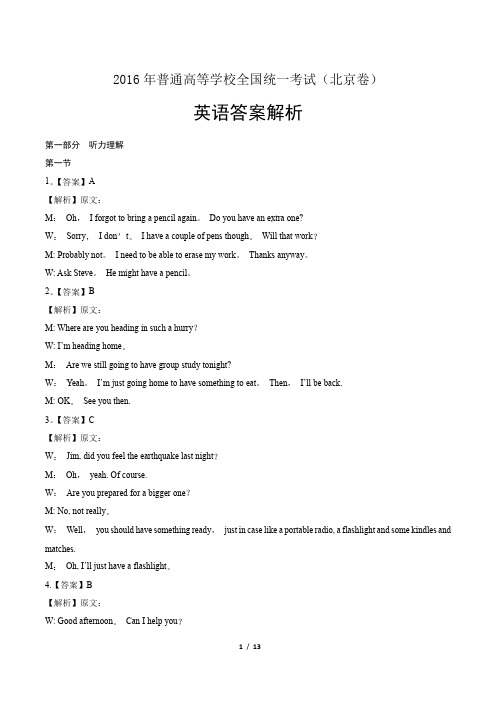
2016年普通高等学校全国统一考试(北京卷)英语答案解析第一部分听力理解第一节1。
【答案】A【解析】原文:M:Oh,I forgot to bring a pencil again。
Do you have an extra one?W:Sorry,I don’t。
I have a couple of pens though。
Will that work?M: Probably not。
I need to be able to erase my work。
Thanks anyway。
W: Ask Steve。
He might have a pencil。
2。
【答案】B【解析】原文:M: Where are you heading in such a hurry?W: I’m heading home。
M:Are we still going to have group study tonight?W:Yeah。
I’m just going home to have something to eat。
Then,I’ll be back.M: OK。
See you then.3。
【答案】C【解析】原文:W:Jim, did you feel the earthquake last night?M:Oh,yeah. Of course.W:Are you prepared for a bigger one?M: No, not really。
W:Well,you should have something ready,just in case like a portable radio, a flashlight and some kindles and matches.M:Oh, I’ll just have a flashlight。
4.【答案】B【解析】原文:W: Good afternoon。
Can I help you?M: Good afternoon。
2016考研英语二答案解析:完形填空
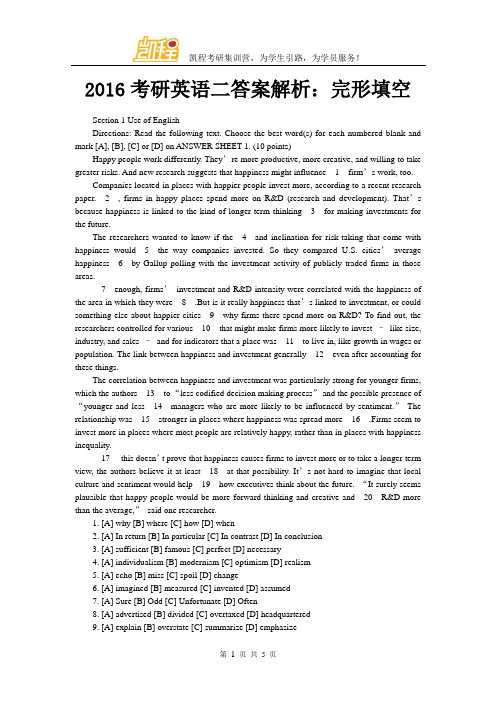
2016考研英语二答案解析:完形填空Section 1 Use of EnglishDirections: Read the following text. Choose the best word(s) for each numbered blank and mark [A], [B], [C] or [D] on ANSWER SHEET 1. (10 points)Happy people work differently. They’re more productive, more creative, and willing to take greater risks. And new research suggests that happiness might influence__1__firm’s work, too.Companies located in places with happier people invest more, according to a recent research paper.__2__, firms in happy places spend more on R&D (research and development). That’s because happiness is linked to the kind of longer-term thinking__3__for making investments for the future.The researchers wanted to know if the__4__and inclination for risk-taking that come with happiness would__5__the way companies invested. So they compared U.S. cities’average happiness__6__by Gallup polling with the investment activity of publicly traded firms in those areas.__7__enough, firms’investment and R&D intensity were correlated with the happiness of the area in which they were__8__.But is it really happiness that’s linked to investment, or could something else about happier cities__9__why firms there spend more on R&D? To find out, the researchers controlled for various__10__that might make firms more likely to invest –like size, industry, and sales –and for indicators that a place was__11__to live in, like growth in wages or population. The link between happiness and investment generally__12__even after accounting for these things.The correlation between happiness and investment was particularly strong for younger firms, which the authors__13__to “less codified decision making process”and the possible presence of “younger and less__14__managers who are more likely to be influenced by sentiment.”The relationship was__15__stronger in places where happiness was spread more__16__.Firms seem to invest more in places where most people are relatively happy, rather than in places with happiness inequality.__17__ this doesn’t prove that happiness causes firms to invest more or to take a longer-term view, the authors believe it at least__18__at that possibility. It’s not hard to imagine that local culture and sentiment would help__19__how executives think about the future. “It surely seems plausible that happy people would be more forward-thinking and creative and__20__R&D more than the average,”said one researcher.1. [A] why [B] where [C] how [D] when2. [A] In return [B] In particular [C] In contrast [D] In conclusion3. [A] sufficient [B] famous [C] perfect [D] necessary4. [A] individualism [B] modernism [C] optimism [D] realism5. [A] echo [B] miss [C] spoil [D] change6. [A] imagined [B] measured [C] invented [D] assumed7. [A] Sure [B] Odd [C] Unfortunate [D] Often8. [A] advertised [B] divided [C] overtaxed [D] headquartered9. [A] explain [B] overstate [C] summarize [D] emphasize10. [A] stages [B] factors [C] levels [D] methods11. [A] desirable [B] sociable [C] reputable [D] reliable12. [A] resumed [B] held [C]emerged [D] broke13. [A] attribute [B] assign [C] transfer [D]compare14. [A] serious [B] civilized [C] ambitious [D]experienced15. [A] thus [B] instead [C] also [D] never16. [A] rapidly [B] regularly [C] directly [D] equally17. [A] After [B] Until [C] While [D] Since18. [A] arrives [B] jumps [C] hints [D] strikes19. [A] shape [B] rediscover [C] simplify [D] share 20. [A] pray for [B] lean towards [C] give away [D] send out1. [标准答案] [C]how[考点分析] 连词辨析[选项分析] 根据语境,“新发现表明:快乐可能会影响工作__的稳定。
高中英语真题-2016高考英语【二轮】完形填空选练(4)
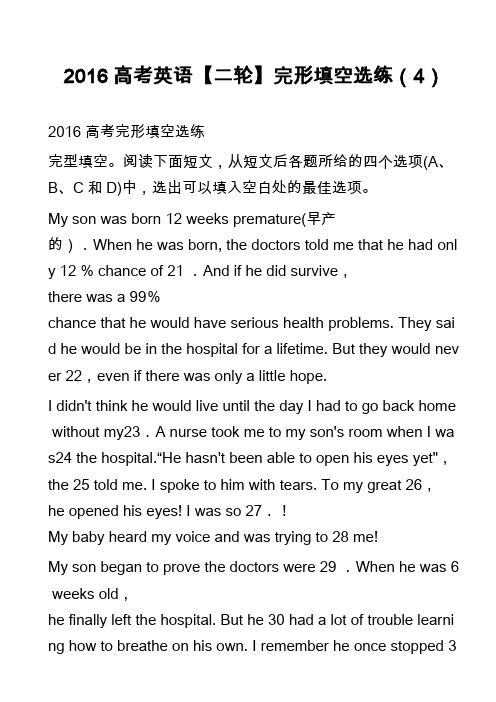
2016高考英语【二轮】完形填空选练(4)2016高考完形填空选练完型填空。
阅读下面短文,从短文后各题所给的四个选项(A、B、C和D)中,选出可以填入空白处的最佳选项。
My son was born 12 weeks premature(早产的).When he was born, the doctors told me that he had onl y 12 % chance of 21 .And if he did survive,there was a 99%chance that he would have serious health problems. They sai d he would be in the hospital for a lifetime. But they would nev er 22,even if there was only a little hope.I didn't think he would live until the day I had to go back home without my23.A nurse took me to my son's room when I wa s24 the hospital.“He hasn't been able to open his eyes yet",the 25 told me. I spoke to him with tears. To my great 26,he opened his eyes! I was so 27.!My baby heard my voice and was trying to 28 me!My son began to prove the doctors were 29 .When he was 6 weeks old,he finally left the hospital. But he 30 had a lot of trouble learni ng how to breathe on his own. I remember he once stopped 31 and turned grey after eating. I turned to the doctors and the y made him 32 again. he also had difficulty with 33 .The do ctors had to leave a tube placed in his stomach 34 he could g et enough food.When my little baby was 3 months old,he was so 35 at that time---he was only 5 pounds in weight. The doctors got the 36 out la st year because he could eat without it and now he is a 5-year-old healthy boy.I will never forget how 37 his life is and how many people foug ht to save him. I am forever 38 for what the doctors did. I reall y believe that it was 39 that saved my baby's life. So never 40 hope!21. A. surviving B. recovering C. succeeding D. escap ing22. A. get back B. give up C. give in D. get up23. A. brother B. husband C. baby D. parent24. A. visiting B. calling C. approaching D. leaving25. A. doctor B. nurse C. cleaner D. reporter26. A. surprise B. disappointment C. knowledge D. sad ness27. A. curious B. interested C. excited D. satisfied28. A. hurt B. see C. influence D. touch29. A. right B. wise C. serious D. wrong30. A. hardly B. never C. still D. seldom31. A. jumping B. walking C. moving D. breathing32. A. alive B. active C. dead D. powerful33. A. eating B. sleeping C. standing D. sitting34. A. if B. as C. so D. after35. A. strong B. thin C. tall D. clever36. A. bag B. tube C. food D. metal37. A. wonderful B. short C. strong D. valuable38. A.regretful B. hateful C. thankful D. fearful39. A. hope B. encouragement C. money D. bravery40. A. forget B. find C. get D. lose参考答案20-25ABCDB 26-30 ACBDC 31-35 DAACB 36-40 BDCAD完形填空。
2016上海高考英语完形填空答案
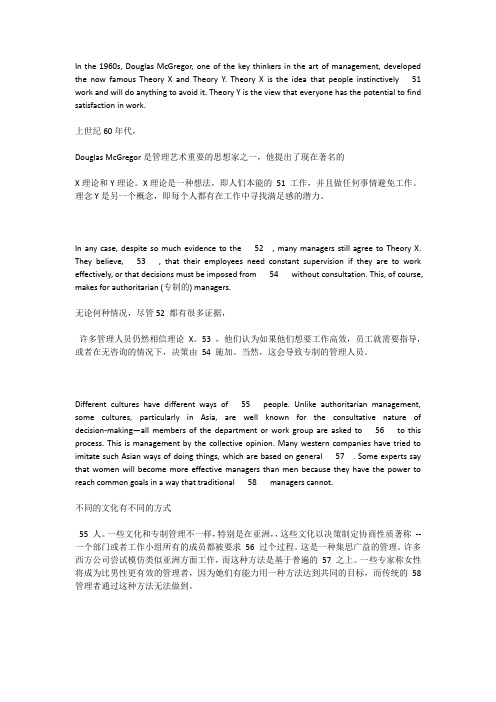
In the 1960s, Douglas McGregor, one of the key thinkers in the art of management, developed the now famous Theory X and Theory Y. Theory X is the idea that people instinctively 51 work and will do anything to avoid it. Theory Y is the view that everyone has the potential to find satisfaction in work.上世纪60年代,Douglas McGregor是管理艺术重要的思想家之一,他提出了现在著名的X理论和Y理论。
X理论是一种想法,即人们本能的51 工作,并且做任何事情避免工作。
理念Y是另一个概念,即每个人都有在工作中寻找满足感的潜力。
In any case, despite so much evidence to the 52 , many managers still agree to Theory X. They believe, 53 , that their employees need constant supervision if they are to work effectively, or that decisions must be imposed from 54 without consultation. This, of course, makes for authoritarian (专制的) managers.无论何种情况,尽管52 都有很多证据,许多管理人员仍然相信理论X。
53 ,他们认为如果他们想要工作高效,员工就需要指导,或者在无咨询的情况下,决策由54 施加。
当然,这会导致专制的管理人员。
高考英语全国卷2016 II 完形填空翻译与解析
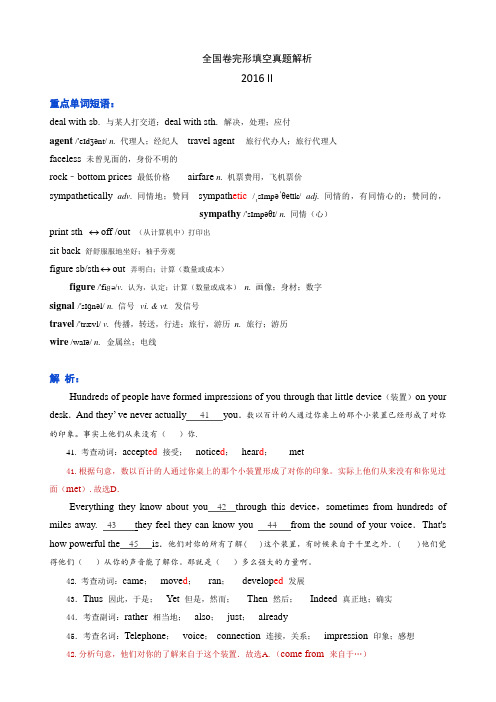
50.考查动词:arrange筹备,安排;postpone推迟;confirm证实,确认;book预定
51.考查短语:for the first time第一次;at any time随时;
from time to time不时地,间或;in good time及时
50.因为家庭中的紧急事情我要立刻预定(book)回家的航班.故分别选D.
Powerful,yes,but not always46.强有力,是的,但不会总是()。
46.考查形容词:direct直接的;useful有用的;easy;accurate准确的
46.根据空格前的可知前后为转折关系。句意为:电话虽然功能虽然很强大,但也并不总是很准确(accurate)。故选D.[下文作者通过例子印证了这一点]
42.分析句意,他们对你的了解来自于这个装置.故选A.(come from来自于…)
43.上一句提到双方距离很遥远,而此句提到他们通过你的声音就能了解你。前后是转折关系,故选B;
44. 别人只要通过声音就可以了解你。此处使用just表示强调;
高考英语全国卷2016 II 完形填空翻译与解析

43.上一句提到双方距离很遥远,而此句提到他们通过你的声音就能了解你。前后是转折关系,故选B;
44. 别人只要通过声音就可以了解你。此处使用just表示强调;
45.单词选项里只有“Telephone电话”是装置,故选A。从第二段的第二句话“only by phone”也可知本文介绍的是电话。
Sitting back in the car on the way to the airport,I figured it all out.Rani’s59----her warm smile,her nods,her‘I'm here for you’60were all silent signals that didn't travel through wires.坐在去机场的车里,我弄明白了。Rani的( )---她温暖的微笑,她的点头,她的“有我在你身边呢”( ),这些都是无声的信号,并没有通过电话线传播过来。
sympatheticallyadv.同情地;赞同sympathetic/ˌsɪmpəˈθetɪk/adj.同情的,有同情心的;赞同的,sympathy/'sɪmpəθɪ/n.同情(心)
printsth off /out(从计算机中)打印出
sit back舒舒服服地坐好;袖手旁观
figuresb/sth out弄明白;计算(数量或成本)
47.48.49. 由句意知,Rain是我未曾谋面的代理人,说明我从来没有亲自(in person)见过她.但她冰冷的声音使我不高兴(annoyed)。所以我曾经想过另外找(find)代理人取代她.故选A,A,C。
One morning,I had to50an immediate flight home for a family emergency.I ran into Rani’s office51.一天早晨,因为家里有紧急事情,我必须()一个立即回家的航班。我跑进Rani的办公室()。
高中英语真题-2016高考英语二轮完形填空精选(3)_1
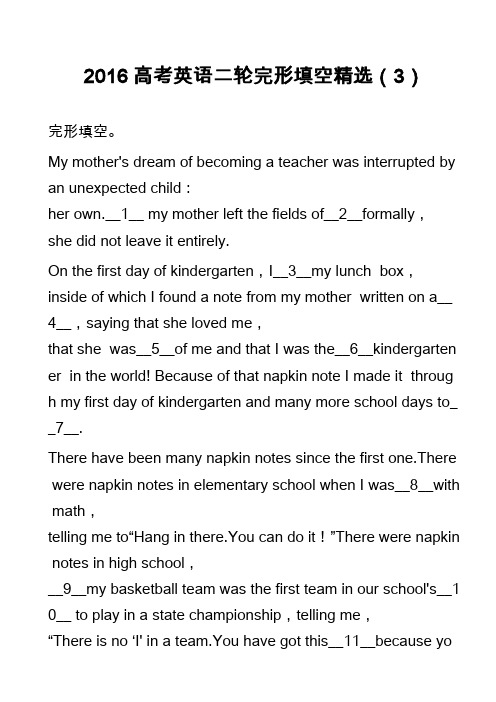
2016高考英语二轮完形填空精选(3)完形填空。
My mother's dream of becoming a teacher was interrupted by an unexpected child:her own.__1__ my mother left the fields of__2__formally,she did not leave it entirely.On the first day of kindergarten,I__3__my lunch box,inside of which I found a note from my mother written on a__ 4__,saying that she loved me,that she was__5__of me and that I was the__6__kindergarten er in the world! Because of that napkin note I made it throug h my first day of kindergarten and many more school days to_ _7__.There have been many napkin notes since the first one.There were napkin notes in elementary school when I was__8__with math,telling me to“Hang in there.You can do it!”There were napkin notes in high school,__9__my basketball team was the first team in our school's__1 0__ to play in a state championship,telling me,“There is no ‘I' in a team.You have got this__11__because you know how to__12__.”And there were even napkin notes whi ch were__13__to me in college and graduate school,far away from my mother's__14__touch.Despite the changes of colleges,majors,boyfriends,and the ways I looked at the world,my mother's encouragement,support and teachings__15__in years of love and napkin note s.At Christmas this year,my fortyyearold mother was__16__going back to school to ear n her degree in teaching.I also gave her a Christmas gift for s chool:a lunch bag filled with her favorite foods.__17__she opened u p her“You can do it!”napkin note__18__me,tears began running down her face.When her eyes met mine ,I knew that she__19__my unspoken message:My mother is,and has always been,a(n)__20__.从我上幼儿园的第一天起,妈妈不断给我写便条,给我鼓励和支持,是妈妈爱的便条,帮我克服了一个又一个困难。
2016年四川省自贡市中考英语试卷-答案

四川省自贡市初2016届毕业生学业考试英语答案解析第Ⅰ卷第一部分听力第一节1.【答案】A2.【答案】B3.【答案】A4.【答案】B5.【答案】C第二节6.【答案】A7.【答案】B8.【答案】C9.【答案】C10.【答案】A11.【答案】A12.【答案】B13.【答案】B14.【答案】B15.【答案】A16.【答案】A17.【答案】B18.【答案】A19.【答案】C20.【答案】B第二部分基础知识运用第一节单项填空21.【答案】C【解析】第一空后的字母“h”的读音以元音音素开头,且泛指“一个”,故其前应用不定冠词an;doesn' t make any sound意为“不发音”,是固定用法。
故选C。
【考点】冠词和固定用法22.【答案】A【解析】information意为“信息”;experience意为“经验,经历”;practice意为“练习”。
由答语可知,问句是问“我”怎样才能获得关于2016年奥运会的一些信息。
故选A。
【考点】名词辨析23.【答案】B【解析】定语从句的先行词是指人的singer,且先行词在从句中作主语,故用关系代词who which在定语从句中指物,whom在定语从句中指人,作宾语,均不符合语境。
故选B。
【考点】定语从句24.【答案】C【解析】由答语中的“I am not Sure.”可知,此处表示可能性不大的推测。
might意为“也许”,表示的可能性较小,符合句意。
shall不能表示推测。
【考点】情态动词辨析25.【答案】A【解析】由答语“No,our uncle made it for us.”可知,问句是问“是不是你们自己做的风筝”。
表示“你们自己”用yourselves故选A。
【考点】反身代词26.【答案】C【解析】句意为:当你感到无助和孤独时,只需记住你在这个世界上并不是独自一人,因为你的朋友们都在你身边。
第一空表示“孤独的,寂寞的”,应用lonely;第二空表示“独自,一个人”,应用alone。
2016-2020年考研英语(二)真题:完形填空
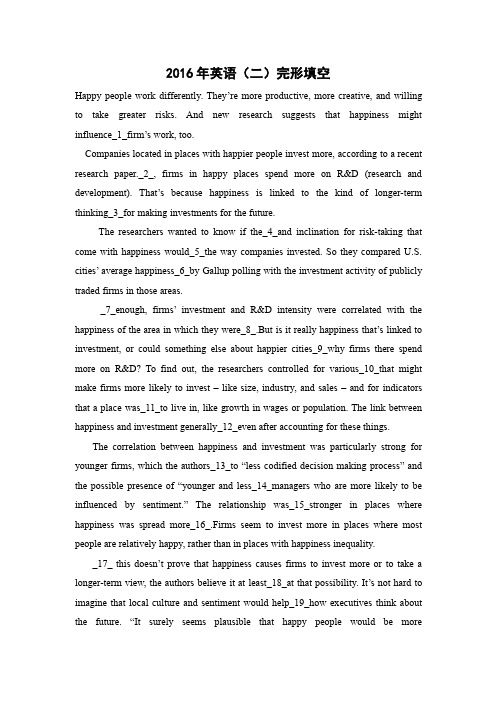
2016年英语(二)完形填空Happy people work differently.They’re more productive,more creative,and willing to take greater risks.And new research suggests that happiness might influence_1_firm’s work,too.Companies located in places with happier people invest more,according to a recent research paper._2_,firms in happy places spend more on R&D(research and development).That’s because happiness is linked to the kind of longer-term thinking_3_for making investments for the future.The researchers wanted to know if the_4_and inclination for risk-taking that come with happiness would_5_the way companies invested.So they compared U.S. cities’average happiness_6_by Gallup polling with the investment activity of publicly traded firms in those areas._7_enough,firms’investment and R&D intensity were correlated with the happiness of the area in which they were_8_.But is it really happiness that’s linked to investment,or could something else about happier cities_9_why firms there spend more on R&D?To find out,the researchers controlled for various_10_that might make firms more likely to invest–like size,industry,and sales–and for indicators that a place was_11_to live in,like growth in wages or population.The link between happiness and investment generally_12_even after accounting for these things.The correlation between happiness and investment was particularly strong for younger firms,which the authors_13_to“less codified decision making process”and the possible presence of“younger and less_14_managers who are more likely to be influenced by sentiment.”The relationship was_15_stronger in places where happiness was spread more_16_.Firms seem to invest more in places where most people are relatively happy,rather than in places with happiness inequality._17_this doesn’t prove that happiness causes firms to invest more or to take a longer-term view,the authors believe it at least_18_at that possibility.It’s not hard to imagine that local culture and sentiment would help_19_how executives think about the future.“It surely seems plausible that happy people would be moreforward-thinking and creative and_20_R&D more than the average,”said one researcher.1.[A]why[B]where[C]how[D]when2.[A]In return[B]In particular[C]In contrast[D]In conclusion3.[A]sufficient[B]famous[C]perfect[D]necessary4.[A]individualism[B]modernism[C]optimism[D]realism5.[A]echo[B]miss[C]spoil[D]change6.[A]imagined[B]measured[C]invented[D]assumed7.[A]Sure[B]Odd[C]Unfortunate[D]Often8.[A]advertised[B]divided[C]overtaxed[D]headquartered9.[A]explain[B]overstate[C]summarize[D]emphasize10.[A]stages[B]factors[C]levels[D]methods11.[A]desirable[B]sociable[C]reputable[D]reliable12.[A]resumed[B]held[C]emerged[D]broke13.[A]attribute[B]assign[C]transfer[D]compare14.[A]serious[B]civilized[C]ambitious[D]experienced15.[A]thus[B]instead[C]also[D]never16.[A]rapidly[B]regularly[C]directly[D]equally17.[A]After[B]Until[C]While[D]Since18.[A]arrives[B]jumps[C]hints[D]strikes19.[A]shape[B]rediscover[C]simplify[D]share20.[A]pray for[B]lean towards[C]give away[D]send out2017年英语(二)完形填空People have speculated for centuries about a future without work.Today is no different,with academics,writers,and activists once again1that technology is replacing human workers.Some imagine that the coming work-free world will be defined by2.A few wealthy people will own all the capital,and the masses will struggle in an impoverished wasteland.A different and not mutually exclusive3holds that the future will be a wasteland of a different sort,one4by purposelessness:Without jobs to give their lives5,people will simply become lazy and depressed.6today’s unemployed don’t seem to be having a great time.One Gallup poll found that20percent of Americans who have been unemployed for at least a year report having depression,double the rate for7 Americans.Also,some research suggests that the8for rising rates of mortality, mental-health problems,and addicting9poorly-educated middle-aged people is shortage of well-paid jobs.Perhaps this is why many10the agonizing dullness of a jobless future.But it doesn’t11follow from findings like these that a world without work would be filled with unease.Such visions are based on the12of being unemployed in a society built on the concept of employment.In the13of work,a society designed with other ends in mind could14strikingly different circumstances for the future of labor and leisure.Today,the15of work may be a bit overblown.“Many jobs are boring,degrading,unhealthy,and a waste of human potential,”says John Danaher,a lecturer at the National University of Ireland in Galway.These days,because leisure time is relatively16for most workers,people use their free time to counterbalance the intellectual and emotional17of their jobs.“When I come home from a hard day’s work,I often feel18,”Danaher says,adding,“In a world in which I don’t have to work,I might feel rather different”—perhaps different enough to throw himself19a hobby or a passion project with the intensity usually reserved for20matters.1.[A]boasting[B]denying[C]warning[D]ensuring2.[A]inequality[B]instability[C]unreliability[D]uncertainty3.[A]policy[B]guideline[C]resolution[D]prediction4.[A]characterized[B]divided[C]balanced[D]measured5.[A]wisdom[B]meaning[C]glory[D]freedom6.[A]Instead[B]Indeed[C]Thus[D]Nevertheless7.[A]rich[B]urban[C]working[D]educated8.[A]explanation[B]requirement[C]compensation[D]substitute9.[A]under[B]beyond[C]alongside[D]among10.[A]leave behind[B]make up[C]worry about[D]set aside11.[A]statistically[B]occasionally[C]necessarily[D]economically12.[A]chances[B]downsides[C]benefits[D]principles13.[A]absence[B]height[C]face[D]course14.[A]disturb[B]restore[C]exclude[D]yield15.[A]model[B]practice[C]virtue[D]hardship16.[A]tricky[B]lengthy[C]mysterious[D]scarce17.[A]demands[B]standards[C]qualities[D]threats18.[A]ignored[B]tired[C]confused[D]starved19.[A]off[B]against[C]behind[D]into20.[A]technological[B]professional[C]educational[D]interpersonal2018年英语(二)完形填空Why do people read negative Internet comments and do other things that will obviously be painful?Because humans have an inherent need to1uncertainty, according to a recent study in Psychological Science.The new research reveals that the need to know is strong that people will2to satisfy their curiosity even when it is clear the answer will3.In a series of experiments,behavioral scientists at the University of Chicago and the Wisconsin school of Business tested students’willingness to4themselves to unpleasant stimuli in an effort to satisfy curiosity.For one5,each participant was shown a pile of pens that the researcher claimed were from a previous experiment. The twist?Half of the pens would6an electric shock when clicked.Twenty-seven students were told with pens were electrified;another twenty-seven were told only that some were electrified.7left alone in the room.The students who did not know which ones would shock them clicked more pens and incurred more shocks than the students who knew that would8.Subsequent experiments reproduced this effect with other stimuli,9the sound of fingernails on a chalkboard and photographs of disgusting insects.The drive to10is deeply rooted in humans,much the same as the basic drives for11or shelter,says Christopher Hsee of the University of Chicago.Curiosity is often considered a good instinct—it can12new scientific advances,for instance—but sometimes such13can backfire.The insight that curiosity can drive you to do14 things is a profound one.Unhealthy curiosity is possible to15,however.In a final experiment,participants who were encouraged to16how they would feel after viewing an unpleasant picture were less likely to17to see such an image.These results suggest that imagining the 18of following through on one’s curiosity ahead of time can help determine19it is worth the endeavor.Thinking about long-term20is key to reducing the possible negative effects of curiosity,”Hsee says.In other words,don’t read online comments.1.A.ignore B.protect C.discuss D.resolve2.A.refuse B.seek C.wait D.regret3.A.rise st C.hurt D.mislead4.A.alert B.expose C.tie D.treat5.A.trial B.message C.review D.concept6.A.remove B.deliver C.weaken D.interrupt7.A.Unless B.If C.When D.Though8.A.change B.continue C.disappear D.happen9.A.such as B.rather than C.regardless of D.owing to10.A.disagree B.forgive C.discover D.forget11.A.pay B.food C.marriage D.schooling12.A.begin with B.rest on C.lead to D.learn from13.A.inquiry B.withdrawal C.persistence D.diligence14.A.self-deceptive B.self-reliant C.self-evident D.self-destructive15.A.trace B.define C.replace D.resist16.A.conceal B.overlook C.design D.predict17.A.choose B.remember C.promise D.pretend18.A.relief B.outcome C.plan D.duty19.A.how B.why C.where D.whether20.A.limitations B.investments C.consequences D.strategies2019年英语(二)完形填空Weighing yourself regularly is a wonderful way to stay aware of any significant weight fluctuations1,when done too often,this habit can sometimes hurt more that it 2.As for me,weighing myself every day caused ma to shift my focus from being generally healthy and physically active to focusing3on the scale.That was bad to my overall fitness goals.I had gained weight in the form of muscle mass,but thinking only of4the number on the scale,I altered my training program.That conflicted with how I needed to train to5my goals.I also found that weighing myself daily did not provide an accurate6of the hard work and progress I was making in the gym.It takes about three weeks to a month to notice any significant changes in your weight7altering your training program.The most8changes will be observed in skill level,strength and inches lost.For these9I stopped weighing myself every day and switched to a bimonthly weighing schedule10.Since weight loss is not my goal,it is less important for me to 11my weight each week.Weighing every other week allows me to observe and12 any significant weight changes.That tells me whether I need to13my training program.I use my bimonthly weight-in14to get information about my nutrition as well.If my training intensity remains the same,but I'm constantly15and dropping weight, this is a16that I need to increase my daily caloric intake.The17to stop weighing myself every day has done wonders for my overall health,fitness and well-being.I’m experiencing increased zeal for working out since I no longer carry the burden of a18morning weigh-in.I've also experienced greater success in achieving my specific fitness goals.19I’m training according to those goals,not the numbers on a scale.Rather than20over the scale,turn your focus to how you kook,feel,how you clothes fit and your overall energy level.1.A.Therefore B.Otherwise C.However D.Besides2.A.cares B.warns C.reduces D.helps3.A solely B.occasionally C.formally D.initially4.A lowering B.explaining C.accepting D.recording5.A.set B.review C.reach D.modify6.A.depiction B.distribution C.prediction D.definition7.A.regardless of B.aside from C.along with D.due to8.A.rigid B.precise C.immediate D.orderly9.A.judgments B.reasons C.methods D.claims10.A.though B.again C.indeed D.instead11.A.track B.overlook C.conceal D.report12.A.approve of B.hold onto C.account for D.depend on13.A.share B.adjust C.confirm D prepare14.A.features B.rules C.tests D results15.A anxious B.hungry C.sick D.bored16.A.secret B belief C.sign D.principle17.A.necessity B.decision C.wish D.request18.A.surprising B.restricting C.consuming D.disappointing19.A.Because B.Unless C.Until D.If20.A.dominating B.puzzling C.triumphing D.obsessing2020年英语(二)完形填空Being a good parent is,of course,what every parent would like to be.But defining what it means to be a good parent is undoubtedly very_1_,particularly since children respond differently to the same style of parenting.A calm,rule-following child might respond better to a different sort of parenting than,_2_,a younger sibling._3_,there’s another sort of parent that’s a bit easier to_4_:a patient parent. Children of every age benefit from patient parenting.Still,_5_every parent would like to be patient,this is no easy_6_.Sometimes parents get exhausted and frustrated and are unable to maintain a_7_and composed style with their kids.I understand this.You’re only human,and sometimes your kids can_8_you just a little too far. And then the_9_happens:You lose your patience and either scream at your kids or say something that was a bit too_10_and does nobody any good.You wish that you could_11_the clock and start over.We’ve all been there._12_,even though it’s common,it’s important to keep in mind that in a single moment of fatigue,you can say something to your child that you may_13_for a long time.This may not only do damage to your relationship with your child but also_14_ your child’s self-esteem.If you consistently lose your_15_with your kids,then you are inadvertently modeling a lack of emotional control for your kids.We are all becoming increasingly aware of the_16_of modeling tolerance and patience for the younger generation. This is a skill that will help them all throughout life.In fact,the ability to emotionally regulate or maintain emotional control when_17_by stress is one of the most important of all life’s skills.Certainly,it’s incredibly_18_to maintain patience at all times with your children.A more practical goal is to try,to the best of your ability,to be as tolerant and composed as you can when faced with_19_situations involving your children.I can promise you this:As a result of working toward this goal,you and your children will benefit and_20_from stressful moments feeling better physically and emotionally.1.A tedious B pleasant C instructive D tricky2.A in addition B for example C at once D by accident3.A fortunately B occasionally C accordingly D eventually4.A amuse B assist C describe D train5.A while B because C unless D once6.A answer B task C choice D access7.A tolerant B formal C rigid D critical8.A move B drag C push D send9.A mysterious B illogical C suspicious D inevitable10.A boring B naive C harsh D vague11.A turn back B take apart C set aside D cover up12.A overall B instead C however D otherwise13.A like B miss C believe D regret14.A raise B affect C justify D reflect15.A time B bond C race D cool16.A nature B secret C importance D context17.A cheated B defeated C confused D confronted18.A terrible B hard C strange D wrong19.A trying B changing C exciting D surprising20.A hide B emerge C withdraw D escape。
高考高中英语完形填空题
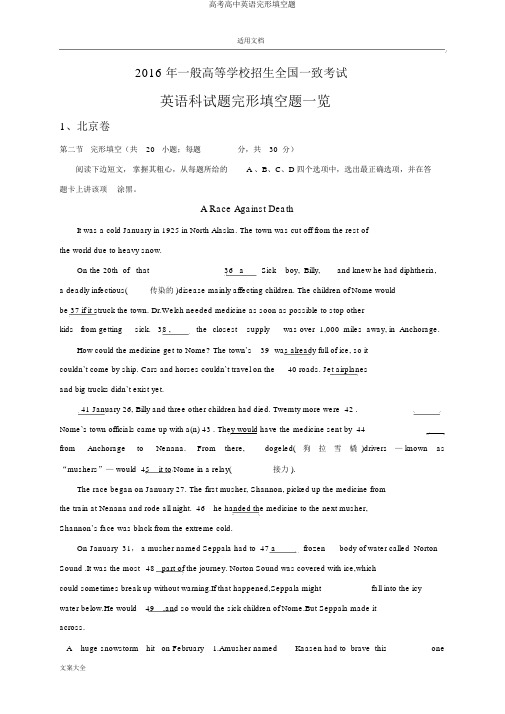
适用文档2016 年一般高等学校招生全国一致考试英语科试题完形填空题一览1、北京卷第二节完形填空(共20小题;每题分,共30分)阅读下边短文,掌握其粗心,从每题所给的 A 、B、C、D 四个选项中,选出最正确选项,并在答题卡上讲该项涂黑。
A Race Against DeathIt was a cold January in 1925 in North Alaska. The town was cut off from the rest ofthe world due to heavy snow.On the 20th of that36a Sick boy,Billy,and knew he had diphtheria, a deadly infectious(传染的 )disease mainly affecting children. The children of Nome wouldbe 37 if it struck the town. Dr.Welch needed medicine as soon as possible to stop otherkids from getting sick.38 ,the closest supply was over 1,000 miles away,in Anchorage.How could the medicine get to Nome? The town`s39was already full of ice, so itcouldn`t come by ship. Cars and horses couldn`t travel on the40 roads. Jet airplanesand big trucks didn`t exist yet.41 January 26, Billy and three other children had died. Twemty more were 42 .Nome`s town officials came up with a(n) 43 . They would have the medicine sent by 44from Anchorage to Nenana.From there,dogeled(狗拉雪橇 )drivers— known as “mushers”— would 45it to Nome in a relay(接力 ).The race began on January 27. The first musher, Shannon, picked up the medicine fromthe train at Nenana and rode all night.46he handed the medicine to the next musher,Shannon`s face was black from the extreme cold.On January 31, a musher named Seppala had to 47 a frozen body of water called Norton Sound .It was the most48part of the journey. Norton Sound was covered with ice,whichcould sometimes break up without warning.If that happened,Seppala might fall into the icy water below.He would49,and so would the sick children of Nome.But Seppala made itacross.point,huge piles of sonw blocked his 50 .He had to leave the trail( 雪橇印迹 )to get around them.Conditions were so bad that it was impossible for him to 51 the trail again. Theonly hope was Balto,Kaasen ’s lead dog, Balto put his nose to the ground, 5 2 to find the smell of other dogs that had traveled on the trail.If Balto failed,it would mean disaster for Nome.The minutes passed by.Suddenly, Balto began to 53 .He had foung the trailAt 5:30 am on February 2, Kaasen and his dog 54 in Nome. Within minutes,Dr.Welch hadthe medicine.He quickly gave it to the sick children.All of them recoverd.Nome had been 55 .425C. fearlessC. harborB. snowyC. paleC. seaC. mailC. WhenC. visitC. swimC. passC. askingC. biteC. camped36. A 37. B 38. D 39.C40. B 41.C42. D43.A44. B45.A46.C47. D48.C49.D50. C 51. A 52.B53. A54.D55. B2、课标卷 -1第一节完形填空(共20小题;每题分,满分30分)阅读下边短文,从短文后各题所给的四个选项(A、B、C 和 D)中,选出能够填入空白处的最正确选项,并在答题卡大将该项涂黑。
历年高考完型填空变式训练二
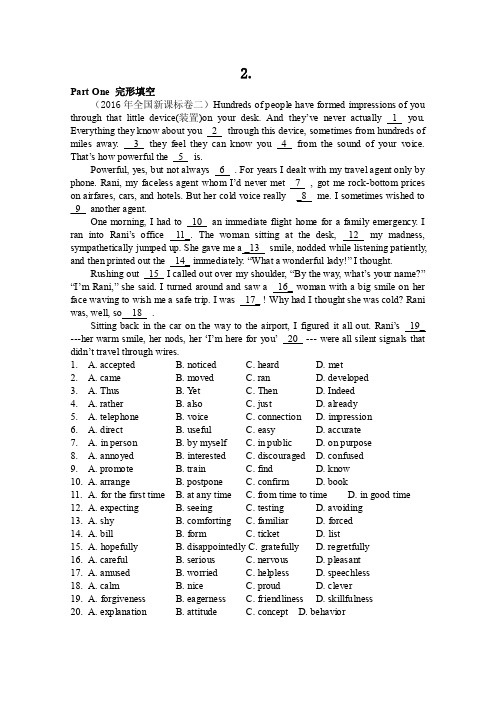
2.Part One 完形填空(2016年全国新课标卷二)Hundreds of people have formed impressions of you through that little device(装置)on your desk. And they‟ve never actually 1 you. Everything they know about you 2 through this device, sometimes from hundreds of miles away. 3 they feel they can know you 4 from the sound of your voice. That‟s how powerful the 5 is.Powerful, yes, but not always 6 . For years I dealt with my travel agent only by phone. Rani, my faceless agent whom I‟d never met 7 , got me rock-bottom prices on airfares, cars, and hotels. But her cold voice really _8 me. I sometimes wished to _9 another agent.One morning, I had to 10 an immediate flight home for a family emergency. I ran into Rani‟s office 11_. The woman sitting at the desk, 12 my madness, sympathetically jumped up. She gave me a _13 smile, nodded while listening patiently, and then printed out the 14_ immediately. “What a wonderful lady!” I thought.Rushing out 15_ I called out over my shoulder, “By the way, what‟s your name?” “I‟m Rani,” she said. I turned around and saw a 16_ woman with a big smile on her face waving to wish me a safe trip. I was 17_ ! Why had I thought she was cold? Rani was, well, so 18 .Sitting back in the car on the way to the airport, I figured it all out. Rani‟s 19_ ---her warm smile, her nods, her …I‟m here for you‟ 20_ --- were all silent signals that didn‟t travel through wires.1. A. accepted B. noticed C. heard D. met2. A. came B. moved C. ran D. developed3. A. Thus B. Y et C. Then D. Indeed4. A. rather B. also C. just D. already5. A. telephone B. voice C. connection D. impression6. A. direct B. useful C. easy D. accurate7. A. in person B. by myself C. in public D. on purpose8. A. annoyed B. interested C. discouraged D. confused9. A. promote B. train C. find D. know10. A. arrange B. postpone C. confirm D. book11. A. for the first time B. at any time C. from time to time D. in good time12. A. expecting B. seeing C. testing D. avoiding13. A. shy B. comforting C. familiar D. forced14. A. bill B. form C. ticket D. list15. A. hopefully B. disappointedly C. gratefully D. regretfully16. A. careful B. serious C. nervous D. pleasant17. A. amused B. worried C. helpless D. speechless18. A. calm B. nice C. proud D. clever19. A. forgiveness B. eagerness C. friendliness D. skillfulness20. A. explanation B. attitude C. concept D. behaviorPart Two语法填空Hundreds of people have formed impressions of you through that little device(装置)on your desk. And they‟ve never ___1___ (actual) met you. Everything they know about you came through this device, sometimes from hundreds of miles away. Y et they feel the y can know you just from the sound of your voice. That‟s ___2___ powerful the telephone is.Powerful, yes, but not always accurate. For years I dealt with my travel agent only by phone. Rani, my faceless agent ___3___ I‟d never met in person, got me rock-bottom prices on airfares, cars, and hotels. But her cold voice really annoyed me. I sometimes wished to find ___4___ agent.One morning, I had to book ___5___ immediate flight home for a family emergency. I ran into Rani‟s office for the first time. The wo man sitting at the desk, seeing my ___6___ (mad), sympathetically jumped up. She gave me a comforting smile, nodded while ___7___ (listen) patiently, and then printed out the ticket immediately. “What a wonderful lady!” I thought.Rushing out gratefully I called out ___8___ my shoulder, “By the way, what‟s your name?” “I‟m Rani,” she said. I turned around and saw a ___9___ (please) woman with a big smile on her face waving to wish me a safe trip. I was speechless! Why had I thought she was cold? Rani was, well, so nice.Sitting back in the car on the way to the airport, I figured it all out. Rani‟s friendliness —her warm smile, her nods, her …I‟m here for you‟ attitude —___10___ (be) all silent signals that didn‟t travel through wires.Part Three课文解析Hundreds of people have formed impressions of you through that little device(装置)on your desk. And they‟ve never actually met you. Everything they know about you came through this device, sometimes from hundreds of miles away.Y et they feel they can know you just from the sound of your voice.That’s how powerful the telephone is.Powerful, yes, but not always accurate. For years I dealt with my travel agent only by phone. Rani, my faceless agent whom I‟d never met in person, got me rock-bottom prices on airfares, cars, and hotels. But her cold voice really annoyed me. I sometimes wished to find another agent.One morning, I had to book an immediate flight home for a family emergency. I ran into Rani‟s office for the first time. The woman sitting at the desk, seeing my madness, sympathetically jumped up. She gave me a comforting smile, nodded while listening patiently, and then printed out the ticket immediately. “What a wonderful lady!” I thought.Rushing out gratefully I called out over my shoulder, “By the way,what‟s your name?” “I‟m Rani,” she said. I turned around and saw a pleasant woman with a big smile on her face waving to wish me a safe trip. I was speechless! Why had I thought she was cold? Rani was, well, so nice.Sitting back in the car on the way to the airport, I figured it all out. Rani’s friendliness —her warm smile, her nods, her ‘I’m here for you’ attitude --- were all silent signals that didn’t travel through wires.一、生词(抄写文章生词,并标注汉语意思):______________________________________________________________________ ______________________________________________________________________ ______________________________________________________________________二、知识点解析:1.dozen/ score/hundred/thousand/million/billion(1)若dozen/hundred/thousand/million/billion与具体数字连用时,其后不加s,也不加of,表示“几打,几个二十,几百,几千,几百万,几十亿”。
2016-2020 年英语(二)完形填空

2016 年英语(二)完形填空Happy people work differently. They’re more productive, more creative, and willing to take greater risks. And new research suggests that happiness might influence_1_firm’s work, too.Companies located in places with happier people invest more, according to a recent research paper._2_, firms in happy places spend more on R&D (research and development). That’s because happiness is linked to the kind of longer-term thinking_3_for making investments for the future.The researchers wanted to know if the_4_and inclination for risk-taking that come with happiness would_5_the way companies invested. So they compared U.S. cities’ average happiness_6_by Gallup polling with the investment activity of publicly traded firms in those areas._7_enough, fi rms’ investment and R&D intensity were correlated with the happiness of the area in which they were_8_.But is it really happiness that’s linked to investment, or could something else about happier cities_9_why firms there spend more on R&D? To find out, the researchers controlled for various_10_that might make firms more likely to invest – like size, industry, and sales – and for indicators that a place was_11_to live in, like growth in wages or population. The link between happiness and investment generally_12_even after accounting for these things.The correlation between happiness and investment was particularly strong for younger firms, which the authors_13_to “less codified decision making process” and the possible presence of “younger and less_14_mana gers who are more likely to be influenced by sentiment.” The relationship was_15_stronger in places where happiness was spread more_16_.Firms seem to invest more in places where most people are relatively happy, rather than in places with happiness inequality._17_ this doesn’t prove that happiness causes firms to invest more or to take a longer-term view, the authors believe it at least_18_at that possibility. It’s not hard to imagine that local culture and sentiment would help_19_how executives think about the future. “It surely seems plausible that happy people would be moreforward-thinking and creative and_20_R&D more than the average,” said one researcher.1.[A] why [B] where [C] how [D] when2.[A] In return [B] In particular [C] In contrast [D] In conclusion3.[A] sufficient [B] famous [C] perfect [D] necessary4.[A] individualism [B] modernism [C] optimism [D] realism5.[A] echo [B] miss [C] spoil [D] change6.[A] imagined [B] measured [C] invented [D] assumed7.[A] Sure [B] Odd [C] Unfortunate [D] Often8.[A] advertised [B] divided [C] overtaxed [D] headquartered9.[A] explain [B] overstate [C] summarize [D] emphasize10.[A] stages [B] factors [C] levels [D] methods11.[A] desirable [B] sociable [C] reputable [D] reliable12.[A] resumed [B] held [C]emerged [D] broke13.[A] attribute [B] assign [C] transfer [D]compare14.[A] serious [B] civilized [C] ambitious [D]experienced15.[A] thus [B] instead [C] also [D] never16.[A] rapidly [B] regularly [C] directly [D] equally17.[A] After [B] Until [C] While [D] Since18.[A] arrives [B] jumps [C] hints [D] strikes19.[A] shape [B] rediscover [C] simplify [D] share20.[A] pray for [B] lean towards [C] give away [D] send out2017 年英语(二)完形填空People have speculated for centuries about a future without work.Today is no different,with academics, writers, and activists once again 1 that technology is replacing human workers. Some imagine that the coming work-free world will be defined by 2 . A few wealthy people will own all the capital, and the masses will struggle in an impoverished wasteland.A different and not mutually exclusive 3 holds that the future will be a wasteland of a different sort, one 4 by purposelessness: Without jobs to give their lives 5 , people will simply become lazy and depressed. 6 today’s unemployed don’t seem to be having a great time. One Gallup poll found that 20 percent of Americans who have been unemployed for at least a year report having depression, double the rate for 7 Americans. Also, some research suggests that the 8 for rising rates of mortality, mental-health problems, and addicting 9 poorly-educated middle-aged people is shortage of well-paid jobs. Perhaps this is why many 10 the agonizing dullness of a jobless future.But it doesn’t 11 follow from findings like these that a world without work would be filled with unease. Such visions are based on the 12 of being unemployed in a society built on the concept of employment. In the 13 of work,a society designed with other ends in mind could 14 strikingly different circumstances for the future of labor and leisure. Today, the 15 of work may be a bit overblown. “Many jobs are boring, degrading, unhealthy, and a waste of human potential,” says John Danaher, a lecturer at the National University of Ireland in Galway.These days, because leisure time is relatively 16 for most workers, people use their free time to counterbalance the intellectual and emotional 17 of their jobs. “When I come home from a hard day’s work, I often feel 18 ,” Danaher says, adding, “In a world in which I don’t have to work, I might feel rather different”—perhaps different enough to throw himself 19 a hobby or a passion project with the intensity usually reserved for 20 matters.1.[A] boasting [B] denying [C] warning [D] ensuring2.[A] inequality [B] instability [C] unreliability [D] uncertainty3.[A] policy [B]guideline [C] resolution [D] prediction4.[A] characterized [B]divided [C] balanced [D]measured5.[A] wisdom [B] meaning [C] glory [D] freedom6.[A] Instead [B] Indeed [C] Thus [D] Nevertheless7.[A] rich [B] urban [C]working [D] educated8.[A] explanation [B] requirement [C] compensation [D] substitute9.[A] under [B] beyond [C] alongside [D] among10.[A] leave behind [B] make up [C] worry about [D] set aside11.[A] statistically [B] occasionally [C] necessarily [D] economically12.[A] chances [B] downsides [C] benefits [D] principles13.[A] absence [B] height [C] face [D] course14.[A] disturb [B] restore [C] exclude [D] yield15.[A] model [B] practice [C] virtue [D] hardship16.[A] tricky [B] lengthy [C] mysterious [D] scarce17.[A] demands [B] standards [C] qualities [D] threats18.[A] ignored [B] tired [C] confused [D] starved19.[A] off [B] against [C] behind [D] into20.[A] technological [B] professional [C] educational [D] interpersonal2018 年英语(二)完形填空Why do people read negative Internet comments and do other things that will obviously be painful? Because humans have an inherent need to 1 uncertainty, according to a recent study in Psychological Science. The new research reveals that the need to know is strong that people will 2 to satisfy their curiosity even when it is clear the answer will 3 .In a series of experiments, behavioral scientists at the University of Chicago and the Wisconsin school of Business tested students’ willingness to 4 themselves to unpleasant stimuli in an effort to satisfy curiosity. For one 5 , each participant was shown a pile of pens that the researcher claimed were from a previous experiment. The twist? Half of the pens would 6 an electric shock when clicked.Twenty-seven students were told with pens were electrified; another twenty-seven were told only that some were electrified. 7 left alone in the room. The students who did not know which ones would shock them clicked more pens and incurred more shocks than the students who knew that would 8 . Subsequent experiments reproduced this effect with other stimuli, 9 the sound of fingernails on a chalkboard and photographs of disgusting insects.The drive to 10 is deeply rooted in humans, much the same as the basic drives for 11 or shelter, says Christopher Hsee of the University of Chicago. Curiosity is often considered a good instinct—it can 12 new scientific advances, for instance—but sometimes such 13 can backfire. The insight that curiosity can drive you to do 14 things is a profound one.Unhealthy curiosity is possible to 15, however. In a final experiment, participants who were encouraged to 16 how they would feel after viewing an unpleasant picture were less likely to 17 to see such an image. These results suggest that imagining the 18 of following through on one’s curiosity ahead of time can help determine 19 it is worth the endeavor. Thinking about long-term 20 is key to reducing the possible negative effects of curiosity,” Hsee says. In other words, don’t read online comments.1.A.ignore B.protect C.discuss D.resolve2.A.refuse B.seek C.wait D.regret3.A.rise st C.hurt D.mislead4.A.alert B.expose C.tie D.treat5.A.trial B.message C.review D.concept6.A.remove B.deliver C.weaken D.interrupt7.A.Unless B.If C.When D.Though8.A.change B.continue C.disappear D.happen9.A.such as B.rather than C.regardless of D.owing to10.A.disagree B.forgive C.discover D.forget11.A.pay B.food C.marriage D.schooling12.A.begin with B.rest on C.lead to D.learn from13.A.inquiry B.withdrawal C.persistence D.diligence14.A.self-deceptive B.self-reliant C.self-evident D.self-destructive15.A.trace B.define C.replace D.resist16.A.conceal B.overlook C.design D.predict17.A.choose B.remember C.promise D.pretend18.A.relief B.outcome C.plan D.duty19.A.how B.why C.where D.whether20.A.limitations B.investments C.consequences D.strategies2019 年英语(二)完形填空Weighing yourself regularly is a wonderful way to stay aware of any significant weight fluctuations 1 , when done too often, this habit can sometimes hurt more that it 2 .As for me, weighing myself every day caused ma to shift my focus from being generally healthy and physically active to focusing 3 on the scale. That was bad to my overall fitness goals. I had gained weight in the form of muscle mass, but thinking only of 4 the number on the scale, I altered my training program. That conflicted with how I needed to train to 5 my goals.I also found that weighing myself daily did not provide an accurate 6 of the hard work and progress I was making in the gym. It takes about three weeks to a month to notice any significant changes in your weight 7 altering your training program. The most 8 changes will be observed in skill level, strength and inches lost.For these 9 I stopped weighing myself every day and switched to a bimonthly weighing schedule 10 .Since weight loss is not my goal, it is less important for me to 11 my weight each week. Weighing every other week allows me to observe and 12 any significant weight changes. That tells me whether I need to 13 my training program.I use my bimonthly weight-in 14 to get information about my nutrition as well. If my training intensity remains the same, but I'm constantly 15 and dropping weight, this is a 16 that I need to increase my daily caloric intake.The 17 to stop weighing myself every day has done wonders for my overall health, fitness and well-being. I’m experiencing increased zeal for working out since I no longer carry the burden of a 18 morning weigh-in. I've also experienced greater success in achieving my specific fitness goals. 19 I’m training according to those goals, not the numbers on a scale. Rather than 20 over the scale, turn your focus to how you kook, feel, how you clothes fit and your overall energy level.1.A. Therefore B. Otherwise C. However D. Besides2.A. cares B. warns C. reduces D. helps3.A solely B. occasionally C. formally D. initially4.A lowering B. explaining C.accepting D. recording5.A. set B. review C.reach D.modify6.A. depiction B. distribution C. prediction D.definition7.A. regardless of B. aside from C. along with D. due to8.A. rigid B. precise C. immediate D. orderly9.A.judgments B. reasons C. methods D. claims10.A. though B. again C.indeed D. instead11.A. track B. overlook C.conceal D. report12.A. approve of B. hold onto C.account for D. depend on13.A. share B. adjust C. confirm D prepare14.A. features B. rules C.tests D results15.A anxious B. hungry C.sick D. bored16.A. secret B belief C. sign D. principle17.A. necessity B. decision C.wish D. request18.A. surprising B. restricting C. consuming D. disappointing19.A. Because B. Unless C.Until D. If20.A. dominating B. puzzling C.triumphing D. obsessing2020 年英语(二)完形填空Being a good parent is, of course, what every parent would like to be. But defining what it means to be a good parent is undoubtedly very _1_, particularly since children respond differently to the same style of parenting. A calm, rule-following child might respond better to a different sort of parenting than, _2_, a younger sibling._3_, there’s another sort of parent that’s a bit easier to _4_: a patient parent. Children of every age benefit from patient parenting. Still, _5_ every parent would like to be patient, this is no easy _6_. Sometimes parents get exhausted and frustrated and are unable to maintain a _7_ and composed style with their kids. I understand this.You’re only human, and sometimes your kids can _8_ you just a little too far. And then the _9_ happens: You lose your patience and either scream at your kids or say something that was a bit too _10_ and does nobody any good. You wish that you could _11_ the clock and start over. We’ve all been there._12_, even though it’s common, it’s important to keep in mind that in a single moment of fatigue, you can say something to your child that you may _13_ for a long time. This may not only do damage to your relationship with your child but also _14_ your child’s self-esteem.If you consistently lose your _15_ with your kids, then you are inadvertently modeling a lack of emotional control for your kids. We are all becoming increasingly aware of the _16_ of modeling tolerance and patience for the younger generation. This is a skill that will help them all throughout life. In fact, the ability to emotionally regulate or maintain emotional control when _17_ by stress is one of the most important of all life’s skills.Certainly, it’s incredibly _18_ to maintain patience at all times with your children.A more practical goal is to try, to the best of your ability, to be as tolerant and composed as you can when faced with _19_ situations involving your children. I can promise you this: As a result of working toward this goal, you and your children will benefit and _20_ from stressful moments feeling better physically and emotionally.1.A tedious B pleasant C instructive D tricky2.A in addition B for example C at once D by accident3.A fortunately B occasionally C accordingly D eventually4.A amuse B assist C describe D train5.A while B because C unless D once6.A answer B task C choice D access7.A tolerant B formal C rigid D critical8.A move B drag C push D send9.A mysterious B illogical C suspicious D inevitable10.A boring B naive C harsh D vague11.A turn back B take apart C set aside D cover up12.A overall B instead C however D otherwise13.A like B miss C believe D regret14.A raise B affect C justify D reflect15.A time B bond C race D cool16.A nature B secret C importance D context17.A cheated B defeated C confused D confronted18.A terrible B hard C strange D wrong19.A trying B changing C exciting D surprising20.A hide B emerge C withdraw D escape。
2016考研英语二真题及答案解析
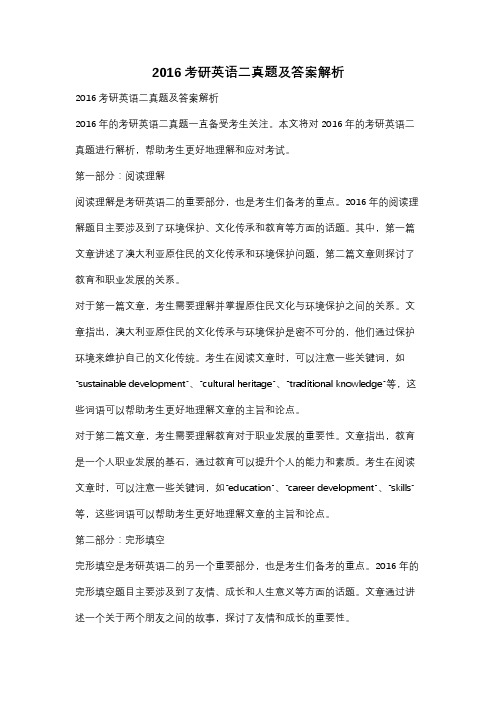
2016考研英语二真题及答案解析2016考研英语二真题及答案解析2016年的考研英语二真题一直备受考生关注。
本文将对2016年的考研英语二真题进行解析,帮助考生更好地理解和应对考试。
第一部分:阅读理解阅读理解是考研英语二的重要部分,也是考生们备考的重点。
2016年的阅读理解题目主要涉及到了环境保护、文化传承和教育等方面的话题。
其中,第一篇文章讲述了澳大利亚原住民的文化传承和环境保护问题,第二篇文章则探讨了教育和职业发展的关系。
对于第一篇文章,考生需要理解并掌握原住民文化与环境保护之间的关系。
文章指出,澳大利亚原住民的文化传承与环境保护是密不可分的,他们通过保护环境来维护自己的文化传统。
考生在阅读文章时,可以注意一些关键词,如“sustainable development”、“cultural heritage”、“traditional knowledge”等,这些词语可以帮助考生更好地理解文章的主旨和论点。
对于第二篇文章,考生需要理解教育对于职业发展的重要性。
文章指出,教育是一个人职业发展的基石,通过教育可以提升个人的能力和素质。
考生在阅读文章时,可以注意一些关键词,如“education”、“career development”、“skills”等,这些词语可以帮助考生更好地理解文章的主旨和论点。
第二部分:完形填空完形填空是考研英语二的另一个重要部分,也是考生们备考的重点。
2016年的完形填空题目主要涉及到了友情、成长和人生意义等方面的话题。
文章通过讲述一个关于两个朋友之间的故事,探讨了友情和成长的重要性。
在这部分的解析中,考生需要理解并掌握文章中的关键词和词组,如“friendship”、“growth”、“meaning of life”等。
通过理解这些关键词和词组,考生可以更好地理解文章的主旨和论点。
第三部分:翻译翻译是考研英语二的最后一部分,也是考生们备考的重点。
2016年的翻译题目主要涉及到了文化差异和社会问题等方面的话题。
2016年全国高考英语试卷之完形填空总汇及解析

新课标Ⅰ卷第一节完形填空(共20 小题;每小题 1.5 分,满分30 分)阅读下面短文,从短文后各题所给的四个选项(A、B、C 和D)中,选出可以填入空白处的最佳选项,并在答题卡上将该项涂黑。
A Heroic DriverLarry works with Transport Drivers. Inc. One morning in 2009. Larry was __41__along 165 north after delivering to one of his 42 . Suddenly, he saw a car with its bright lights on. 43 he got closer, he found 44 vehicle upside down on the road. One more look and he noticed 45 shooting out from under the 46 vehicle. Larry pulled over, set the brake and 47 the fire extinguisher (灭火器). Two good bursts from the extinguisher and the fire was put out.The man who had his bright lights on 48 and told Larry he had 49 an emergency call. They 50 heard a woman’s voice coming from the wrecked (毁坏的) vehicle. 51 the vehicle, they saw that a woman was trying to get out of the broken window. They told her to stay 52 until the emergency personnel arrived, 53 she thought the car was going to 54 . Larry told her that he had already put out the fire and she should not move 55 she injured her neck.Once fire and emergency people arrive, Larry and the other man 56 and let them go to work. Then, Larry asked the 57 if he was needed or 58 to go. They let him and the other man go.One thing is 59 —Larry went above and beyond the call of duty by getting so close to the burning vehicle! His 60 most likely saved the woman’s life.41. A. walking B. touring C.traveling D.rushing42. A. passengers B. colleagues C. employers D. customers43. A. Since B. Although C. As D. If44. A. each B. another C. that D. his45. A. flames B. smoke C. water D. steam46. A. used B. disabled C. removed D. abandoned47. A. got hold of B. prepared C. took charge of D. controlled48. A. came down B. came through C. came in D. came over49. A. returned B. received C. made D. confirmed50. A. then B. again C. finally D. even51. A. Starting B. Parking C. Passing D. Approaching52. A. quiet B. still C. away D. calm53. A. for B. so C. and D. but54. A. explode B. slip away C. fall apart D. crash55. A. as if B. unless C. in case D. after56. A. stepped forward B. backed off C. moved on D. set out57. A. woman B. police C. man D. driver58. A. forbidden B. ready C. asked D. free59. A. for certain B. for consideration C. reported D. checked60. A. patience B. skills C. efforts D. promise【答案】41-45 CDCBA 46-50 BADCA 51-55 DBDAC 56-60 BBDAC【解析】试题分析:本文是一篇记叙文主要介绍了Larry在送货回来的路上遇到了一辆着火的汽车。
2016公共英语二级完形填空真题练习及答案
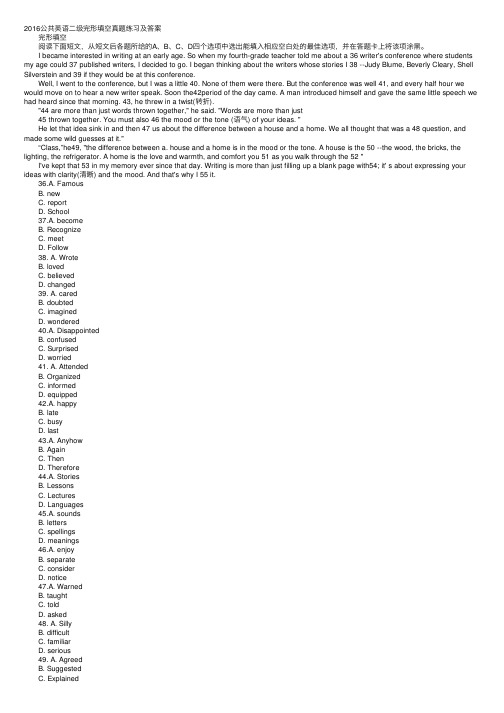
2016公共英语⼆级完形填空真题练习及答案 完形填空 阅读下⾯短⽂,从短⽂后各题所给的A、B、C、D四个选项中选出能填⼊相应空⽩处的最佳选项,并在答题卡上将该项涂⿊。
I became interested in writing at an early age. So when my fourth-grade teacher told me about a 36 writer's conference where students my age could 37 published writers, I decided to go. I began thinking about the writers whose stories I 38 --Judy Blume, Beverly Cleary, Shell Silverstein and 39 if they would be at this conference. Well, I went to the conference, but I was a little 40. None of them were there. But the conference was well 41, and every half hour we would move on to hear a new writer speak. Soon the42period of the day came. A man introduced himself and gave the same little speech we had heard since that morning. 43, he threw in a twist(转折). "44 are more than just words thrown together," he said. "Words are more than just 45 thrown together. You must also 46 the mood or the tone (语⽓) of your ideas. " He let that idea sink in and then 47 us about the difference between a house and a home. We all thought that was a 48 question, and made some wild guesses at it." “Class,”he49, "the difference between a. house and a home is in the mood or the tone. A house is the 50 --the wood, the bricks, the lighting, the refrigerator. A home is the love and warmth, and comfort you 51 as you walk through the 52 " I've kept that 53 in my memory ever since that day. Writing is more than just filling up a blank page with54; it' s about expressing your ideas with clarity(清晰) and the mood. And that's why I 55 it. 36.A. Famous B. new C. report D. School 37.A. become B. Recognize C. meet D. Follow 38. A. Wrote B. loved C. believed D. changed 39. A. cared B. doubted C. imagined D. wondered 40.A. Disappointed B. confused C. Surprised D. worried 41. A. Attended B. Organized C. informed D. equipped 42.A. happy B. late C. busy D. last 43.A. Anyhow B. Again C. Then D. Therefore 44.A. Stories B. Lessons C. Lectures D. Languages 45.A. sounds B. letters C. spellings D. meanings 46.A. enjoy B. separate C. consider D. notice 47.A. Warned B. taught C. told D. asked 48. A. Silly B. difficult C. familiar D. serious 49. A. Agreed B. Suggested C. Explained D. Attempted 50. A. Design B. fortune C. Mood D. building 51. A. lack B. feel C. give D. need 52.A. house B. yard C. hall D. door 53.A. expression B. statement C. standard D. rule 54.A. words B. facts C. numbers D. ideas 55.A. like B. understand C. suggest D. stress 参考译⽂ 我很早就对写作产⽣了兴趣,所以在上四年级时当我的⽼师提到⼀个著名的作家会议,像我这么⼤的学⽣能有机会在会上看到出版作家时,我决定去看看。
2016高考英语全国卷2及答案详解

2016高考英语全国卷2及答案详解DA few students hesitated to start. They waited to see the rest of the class would do. Several others checked the instructions and made something according to one of the model plans provided. Another group built something out of their own imaginations.Once I had a boy who worked experimentally with Tinkertoys in his free time. His constructions filled a shelf in the art classroom and a good part of his bedroom at home. I was delighted at the presence of such a student. Here was an exceptionally creative mind at work. His presence meant that I had an unexpected teaching assistant in class whose creativity would infect(感染) other students.Encouraging this kind of thinking has a downside. I ran the risk of losing those students who had a different style of thinking. Without fail one would declare, ” But I’m just not creative.”“Do you dream at night when you’re asleep?”“Oh, sure.”“So tell me one of your most interesting dreams.” The student would tell something wildl y imaginative. Flying in the sky or in a time machine or growing three heads. “That’s pretty creative. Who does that for you?”“Nobody. I do it.”“Really-at night, when you’re asleep?”“Sure.”“Try doing it in the daytime, in class, okay?”25. The teacher used Tinkertoys in class in order to ________?A. know more about the studentsB. make the lessons more excitingC. raise the students’ interest in artD. teach the students about toy design26. What do we know about the boy mentioned in Paragraph 3?A. He liked to help his teacher.B. He preferred to study alone.C. He was active in class.D. He was imaginative.27. What does the underlined word “downside” in Paragraph 4 probably mean?A. Mistake.B. DrawbackC. Difficulty.D. Burden.28.Why did the teacher ask the students to talk about their dreams?A. To help them to see their creativity.B. To find out about their sleeping habits.C. To help them to improve their memory.D. To find out about their ways of thinking.CReading can be a social activity. Think of the people who belong to book groups. They choose books to read and then meet to discuss them. Now, the website turns the page on the traditional idea of a book group.Members go on the site and register the books they own and would like to share. BookCrossing provides an identification number to stick inside the book. Then the person leaves it in a public place, hoping that the book will have an adventure, traveling far and wide with each new reader who finds it.Bruce Pederson, the managing director of BookCrossing, says, “The two things that change your life are the people you meet and books you read. BookCrossing combines both.”Members leave books on park benches and buses, in train stations and coffee shops. Whoever finds their book will go to the site and record where they found it.People who find a book can also leave a journal entry describing what they thought of it. E-mails are then sent to the BookCrossing to keep them updated about where their books have been found.Bruce peterson says the idea is for people not to be selfish by keeping a book to gather dust on a shelf at home.BookCrossing is part of a trend among people who want to get back to the “real” and not the virtual(虚拟). The site now has more than one million members in more than one hundred thirty-five countries.29. Why does the author mention book groups in the first paragraph?A. To explain what they are.B. To introduce BookCrossing.C. To stress the importance of reading.D. To encourage readers to share their ideas.30. What does the underlined word “it” in Paragraph 2 refer to?A. The bookB. An adventure.C.A public place.D. The identification number.31. What will a BookCrosser do with a book after reading it?A. Meet other readers to discuss it.B. Keep it safe in his bookcase.C. Pass it on to another reader.D. Mail it back to its owner.32. What is the best title for the text?A. Online Reading: A Virtual TourB. Electronic Books: A new TrendC. A Book Group Brings Tradition BackD. A Website Links People through BooksDA new collection of photos brings an unsuccessful Antarctic voyage back to life.Frank Hurley’s pictures would be outstanding----undoubtedly first-rate photo-journalism---if they had been made last week. In fact, they were shot from 1914 through 1916, most of them after a disastrous shipwreck(海滩), by a cameraman who had no reasonable expectation of survival. Many of the images were stored in an ice chest, under freezing water, in the damaged wooden ship.The ship was the Endurance, a small, tight, Norwegian-built three-master that was intended to take Sir Ernest Shackleton and a small crew of seamen and scientists, 27 men in all, to the southernmost shore of Antarc tica’s Weddell Sea. From that point Shackleton wanted to force a passage by dog sled(雪橇) across the continent. The journey was intended to achieve more than what Captain Robert Falcon Scott had done. Captain Scott had reached the South Pole early in 1912 but had died with his four companions on the march back.As writer Caroline Alexander makes clear in her forceful and well-researched story The Endurance, adventuring was even then a thoroughly commercial effort. Scott’s last journey, completed as he lay in a tent dying of cold and hunger, caught the world’s imagination, and a film made in his honor drew crowds. Shackleton, a onetime British merchant-navy officer who had got to within 100 miles of the South Pole in 1908, started a business before his 1914 voyage to make money from movie and still photography. Frank Hurley, a confident and gifted Australian photographer who knew the Antarctic, was hired to make the images, most of which have never before been published.33. What do we know about the photos taken by Hurley?A. They were made last weekB. They showed undersea sceneriesC. They were found by a cameramanD. They recorded a disastrous adventure34. Who reached the South Pole first according to the text?A. Frank HurleyB. Ernest ShackletonC. Robert Falcon ScottD. Caroline Alexander35. What does Alexander think was the purpose of the 1914 voyage?A. Artistic creationB. Scientific researchC. Money makingD. Treasure hunting第二节(共5小题;每小题2分,满分10分)根据短文内容,从短文后的选项中选出能填入空白处的最佳选项。
2016考研英语二答案:完形填空(沪江网校版)

2016考研英语二答案:完形填空(沪江网校版)
考研英语二完型填空
1. C. how
2. B. In particular
3. D. necessary
4. C. optimism
5. D. change
6. B. measured
7. A. Sure
8. D. headquartered
9. A. explain
10. B. factors
11. A. desirable
12. B. held
13. A. attribute
14. D. experienced
15. C. also
16. D. equally
17. C. While
18. C. hints
19. A. shape
20. B. lean towards
本篇文章是关于快乐影响公司运作的讨论。
文章开篇引出人们发现拥有较多乐观开朗员工的公司,更倾向于多投资在研发上这一现象。
于是,相关人员针对这一现象从各种因素出发进行了研究。
这些因素包括:公司规模、公司所在行业、公司营业额、公司总部所在地等等。
最后得出结论:从长远来看,公司投资多少、公司投资方向与乐观并不直接相关,而主要取决于公司决策者的决定。
同时,乐观的人可能比普通人更倾向于前瞻性思考和进行创意型工作。
- 1、下载文档前请自行甄别文档内容的完整性,平台不提供额外的编辑、内容补充、找答案等附加服务。
- 2、"仅部分预览"的文档,不可在线预览部分如存在完整性等问题,可反馈申请退款(可完整预览的文档不适用该条件!)。
- 3、如文档侵犯您的权益,请联系客服反馈,我们会尽快为您处理(人工客服工作时间:9:00-18:30)。
2016年高考真题英语 (全国II卷)51.假定英语课上老师要求同桌之间交换修改作文,。
文中共有10处语言错误,每句中最多有两处。
每处错误仅涉及一个单词的增加、删除或修改。
增加:在缺词处加一个漏字符号(∧),并在其下面写出该加的词。
删除:把多余的词用斜线(﹨)划掉。
删除:在错的词下划一横线,并在该词下面写出修改后的词。
注意:1.每处错误及其修改均仅限一词;2.只允许修改10处,多者(从第11处起)不计分。
The summer holiday is coming. My classmates and I are talking about how to do duringthe holiday. We can chose between staying at home and take a trip. If we stay at home,it is comfortable but there is no need to spend money. But in that case, we will learn little about world. If we go on a trip abroad, we can broaden you view and gain knowledges we cannot get from books. Some classmates suggest we can go to places of interest nearby. I thought that it is a good idea. It does not cost many, yet we canstill learn a lot.补全信息(本大题共5小题,每小题____分,共____分。
)Have you ever visited a garden that seemed just right for you, where the atmosphere of the garden appeared to total more than the sum(总和) of its parts? ____________. But it doesn’t happen by accident. It starts with looking inside yourself and understanding who you are with respect to the natural world and how you approach the gardening process.●____Some people may think that a garden is no more than plants, flowers, patterns and masses of color. Others are concerned about using gardening methods that require less water and fewer fertilizers(肥料). ________. However, there are a number of other reasons that might explain why you want to garden. One of them comes from our earliest years.●Recall(回忆) your childhood memoriesOur model of what a garden should be often goes back to childhood. Grandma’s rose garden and Dad’s vegetable garden might be good or bad, but that’s not what’s important. ____________--how being in those gardens made us feel. If you’d like tobuild a powerful bond with your garden, start by taking some time to recall the gardensof your youth. ____________ then go outside and work out a plan to translate your childhood memories into your grown-up garden. Have fun.A. garden that’s just right for youB. Know why you gardenC. Find a good place for your own gardenD. It’s our experience of the garden that mattersE. It’s delightful to see so many beautiful flowersF. Still others may simply enjoy being outdoors and close to plantsG. You can produce that kind of magical quality in your own garden, tooFor each of those gardens, writer down the strongest memory you have完型填空(本大题共20小题,每小题____分,共____分。
)阅读下面短文,从短文后各题所给的四个选项(A、B、C和D)中,选出可以填入空白处的最佳选项,并在答题卡上将该项涂黑。
Hundreds of people have formed impressions of you through that little device(装置) on your desk. And they’ve never actually ____________ you. Everything they know about you ____________ through this device, sometimes from hundreds of miles away. ________ they feel they can know you ____________ from the sound of your voice. That’s how powerful the ____________ is.Powerful, yes, but not always ____________. For years I dealt with my travel agent only by phone. Rani, my faceless agent whom I’d never met ________, got me rock-bottomprices on airfares, cars, and hotels. But her cold voice really ____________ me. I sometimes wished to ____________ another agent.One morning, I had to ____________ an immediate flight home for a family emergency. I ran into Rani’s office ____________. The woman sitting at the desk, ____________ my madness, sympathetically jumped up. She gave me a ____________ smile, nodded while listening patiently, and then printed out the ____________ immediately. “What a wonderful lady!” I thought.Rushing out ____________ I called out over my shoulder, “By the way, what’s your name?”“I’m Rani,” she said. I turned around and saw a ____________ woman with abig smile on her face waving to wish me a safe trip. I was ____________! Why had I thought she was cold? Rani was, well, so ________.Sitting back in the car on the way to the airport, I figured it all out. Rani’s____________---her warm smile, her nods, her ‘I’m here for you’ ____________---were all silent signals that didn’t travel through wires.21.A. acceptedB. noticedC. heardD. met22.A. cameB. movedC. ranD. developed23.A. ThusB. YetC. ThenD. Indeed24.A. ratherB. alsoC. justD. already25.A. TelephoneB. voiceC. connectionD. impression26.A. directB. usefulC. easyD. accurate27.A. in personB. by myselfC. in publicD. on purpose28.A. annoyedB. interestedC. discouragedD. confused29.A. promoteB. trainC. findD. know30.A. arrangeB. postponeC. confirmD. book31 . A. for the firsttimeB. at any timeC. from time totimeD. in good time32.A. expectingB. seeingC. testingD. avoiding33.A. shyB. comfortingC. familiarD. forced34.A. billB. formC. ticketD. list35A. hopefully B. disappointedly C. gratefully D. regretfully.36A. carefulB. seriousC. nervousD. pleasant.37A. amusedB. worriedC. helplessD. speechless.38A. calmB. niceC. proudD. clever.39A. forgivenessB. eagernessC. friendlinessD. skillfulness.40A. explanationB. attitudeC. conceptD. Behavior.阅读下面材料,在空白处填入适当的内容(1个单词)或括号内单词的正确形式。
